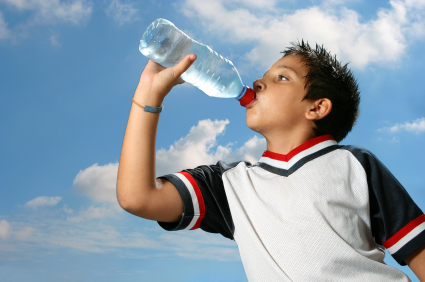 Kids can become dehydrated whatever and whenever they play sports, regardless of season, temperature or relative humidity.
Kids can become dehydrated whatever and whenever they play sports, regardless of season, temperature or relative humidity.
Surprisingly common
Some more surprises:
- Kids become dehydrated very easily: dehydration can begin when an athlete loses as little as 1 percent of body weight. In a 70-pound child, that is less than 1 pound of weight lost through sweat. This about half a liter of body water lost. It is not uncommon for some athletes to lose as much as 5 to 8 pounds through sweat during a game or practice.
- Dehydration affects performance: as little as a 2% decrease in body weight from fluid loss (e.g. 1.2 lb for a 60-lb athlete, less than 4 pounds for a 200-pound athlete) can lead to a significant decrease in muscular strength and stamina;
- Dehydration affects cognition: a 3% decrease in body water can adversely affect cognitive function. In the sports context, this may affect a child's ability to pay attention to the coach or remember a play. A body water deficit of 2% to 3% can compromise sports performance, heat dissipation, and cardiovascular function.1
- Most kids are dehydrated playing sports: two studies of kids at summer sports camps showed that a majority were dehydrated, with 25 to 30 percent showed signs of serious dehydration putting them at increased risk of heat-related illnesses. Kids were dehydrated despite the availability of water and sports drinks, frequent breaks and coaches' encouragement to stay hydrated. The studies also showed that, once children become dehydrated, it is nearly impossible for them to catch up.
- The majority of children are dehydrated before they start playing sports: the same studies at summer sports camps found that almost two-thirds of children were dehydrated even before they hit the field to start practicing. This puts the child at a disadvantage in the sport and increases their risk of heat illness.
Dehydration signs and symptoms
How to know if your child is dehydrated?
If your child tires easily and repeatedly during practices and appears irritable, or her performance suddenly declines, dehydration, and/or inadequate calorie intake may be the cause.
The following are also signs that your child may be dehydrated:
- Thirstiness
- Headache [Note: could also be a sign of concussion]
- Dizziness [Note: could also be a sign of concussion]
- Tired or feeling weak
- Urine is bright yellow in color (urine should be almost clear)
- Apathy or lack of energy
- Grumpiness
- Trouble concentrating [Note: trouble concentrating could also be a sign of concussion]
- Nausea [Note: nausea could also be a sign of a concussion]
The following are signs that your child is severely dehydrated:
- Dry lips and tongue
- Sunken eyes
- Bright colored or dark urine, or urine with a strong odor
- Infrequent urination
- Small volume of urine
Progressive effect
The progressive effects of dehydration are serious. As a child becomes dehydrated, heart rate increases, blood flow to the skin decreases, and a body temperature can rise steadily to dangerous levels. To avoid a potentially life-threatening medical emergency, parents and coaches need to be familiar with the symptoms of and treatment for heat-related illnesses.
Updated and revised April 20, 2017
1. Maughan RJ. Impact of mild dehydration on wellness and on exercise performance. Eur J Clin Nutr. 2003:57(supp. 2): S19-S-23.







